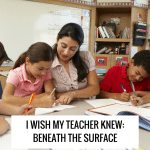Every year as school days come to a close and summer sets in, I find myself sitting at my teacher desk sifting through tokens of gratitude from students. From flowers and lotions to candies and heartfelt notes, families generously express their appreciation for the hard work and care I have invested in their students’ school experience over the course of the year. Inevitably at least one treat makes its way to my desk out of the stereotypical “end of the year teacher gift” character, leaving me smiling or even giggling. This year, it was the half-wrapped Nutrigrain bar that almost made its way into my student’s mouth before she handed it to me, saying, “Thanks for everything, Ms. Denice!”
Around customary “gift-giving” times of the year, including holidays, Teacher Appreciation Week, or the last day of school, I am reminded of the TED Talk by Azul Terronez, “What Makes A Good Teacher Great?” As an author, teacher, and coach, Terronez has been asking students the question, “What makes a good teacher great?” for the past twenty-four years. He launched his TED Talk with the student response: “Great teachers eat apples.” The audience chuckles, as did I the first time I watched the video. To the surprise of listeners, Terronez goes on to explain why the statement “Great teachers eat apples” is actually a frequent and profound response to this question.
[bctt tweet=”Great teachers eat apples.” username=””]
To uncover the meaning behind students’ elevated views of the apple-eating teacher, Terronez began visibly eating apples at school. Students noticed his affinity for apples and started to bring him apples as gifts. He ultimately came to this realization: “Kids wanted to see me as somebody who was willing to receive a gift from them. The apple was a symbol of our relationship. There was goodness in that and trust.”
This sentiment brought new meaning to my acceptance of gifts from students as acknowledgment not just of my hard work but of our relationships as teacher and students. Visibly and graciously utilizing gifts from students developed a sense of trust and community in the classroom, freeing students to take risks and learn in an environment where they felt welcomed, valued, and empowered. So, when my student danced into the classroom the morning of Teacher Appreciation Day with a new lanyard, complete with an elaborate explanation of its fanciness, features, and flare to behoove a busy, fashion-forward teacher like me (her words, not mine), I promptly replaced the 2016 Cubs World Series Champions I had fondly and proudly worn since it was gifted to me when the Cubs won the series last school year.
The truth is, it was never about a lanyard: it was about trust and acceptance. The lanyard was a symbol of my relationship with the student, someone attentive to my responsibilities, needs, and significance as her teacher. I now make efforts to accept gifts with grace and dignity, knowing a Bath and Body Works basket or a greeting card or even a half-eaten Nutrigrain bar means much more than what sits in front of me on my desk; knowing great teachers eat apples.






